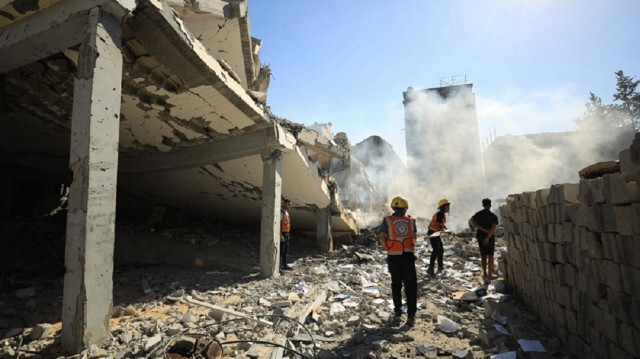Stalemate in Gaza: A Comprehensive Analysis
As the Gaza conflict rages on, mediators struggle to facilitate a ceasefire and hostage release amidst ongoing confrontations and worsening humanitarian conditions.
Published September 08, 2024 - 00:09am

Image recovered from yenisafak.com
Israeli officials expressed skepticism regarding a new cease-fire proposal aimed at ending hostilities between Israel and Hamas. As part of ongoing negotiations facilitated by the U.S., Qatar, and Egypt, the proposed plan seeks to broker a prisoner exchange and halt the military offensive in Gaza. However, Israeli sources cited by Israel's Public Broadcasting Corporation indicate that the proposal may fail to meet the demands of both conflicting parties.
Prime Minister Benjamin Netanyahu convened a high-level security meeting to discuss the proposal, emphasizing ongoing military operations and Israeli reactions to the deaths of six hostages found in a Gaza tunnel. As international mediators strive for peace, Israel's insistence on continuing its campaign without substantial Hamas concessions has presented a significant blockade.
The conflict, which reignited on October 7 following a deadly Hamas attack, has led to extensive casualties. The Palestinian Ministry of Health in Gaza reports nearly 40,900 deaths and over 94,000 injuries, predominantly among women and children. These figures underscore the severe humanitarian crisis exacerbated by a blockade that has left Gaza struggling with shortages of essential supplies. Accusations of genocide have been levied against Israel at the International Court of Justice, further complicating an already volatile situation.
Despite numerous efforts from international intermediaries, the hostility persists, with neither side showing readiness to compromise significantly. The absence of a swift truce and prisoner release deepens frustrations on both sides. The United Nations Relief and Works Agency's head, Philippe Lazzarini, recently called for an immediate ceasefire, echoing sentiments of weariness and despair from within Gaza and the broader international community.
Hamas has urged the United States to exert genuine pressure on Israel to secure a cease-fire, with senior negotiator Khalil al Hayya criticizing the U.S. for its unwavering support of Israel. This plea comes amidst rising internal pressure on Netanyahu's administration to reach an agreement following the recovery of six hostage bodies. In contrast, Netanyahu remains firm, stating in an interview that no accord is forthcoming. He also emphasized the necessity for Israeli forces to control strategic points to prevent Gaza from becoming a replenished terrorist enclave.
Netanyahu's firm stance has drawn criticism from various quarters, including Hamas, which accuses him of intentionally obstructing peace efforts. Simultaneously, U.S. officials like John Kirby have expressed cautious optimism, noting that while significant progress has been made, detailed negotiations remain challenging.
In addition to the political maelstrom, violent altercations have continued unabated. Recent Israeli airstrikes targeted Gaza, resulting in numerous Palestinian casualties. Concurrently, Hezbollah activity on Israel's northern front has instigated further military responses, illustrating the multi-front nature of Israel's security challenges.
The human cost of the conflict is staggering. According to reports, the initial Hamas attack resulted in over 1,200 Israeli fatalities, predominantly civilians. Ongoing Israeli retaliatory actions have consequently led to tens of thousands of Palestinian deaths, including substantial numbers of women and children, as stated by the United Nations.
Adding to the complexity, Israeli operations in the West Bank have intensified, resulting in significant Palestinian casualties. The humanitarian crisis in Gaza has deteriorated, with outbreaks of diseases such as polio demanding extensive vaccination campaigns. The World Health Organization has mobilized efforts to vaccinate hundreds of thousands of children, underscoring the severe public health emergency.
Simultaneously, hostilities have continued on multiple fronts. Recent confrontations between Israeli forces and Palestinian militants in the West Bank highlight the profound ongoing strife. These clashes have led to further casualties, with reports of fatalities among both combatants and civilians.
Efforts to address the hostage situation have been particularly fraught. While some hostages were released during a brief cease-fire, the status and conditions of many remain uncertain. Testimonies from freed hostages reveal dire conditions during captivity, including abuse and deprivation. The Israeli military's occasional successes in hostage recovery have come at a high cost, often resulting in additional civilian casualties.
International diplomatic efforts continue to be crucial. German Foreign Minister Annalena Baerbock's repeated visits to the region illustrate the persistent attempts to mediate peace despite the intransigence displayed by both parties. Her discussions in Saudi Arabia, Jordan, and Israel highlight the international community's ongoing commitment to resolving the crisis.
Despite the deadlock, the urgency for an effective resolution remains critical. The deteriorating humanitarian situation, continuous military escalations, and the political dynamics all underscore the need for a sustainable ceasefire and substantial humanitarian aid.







